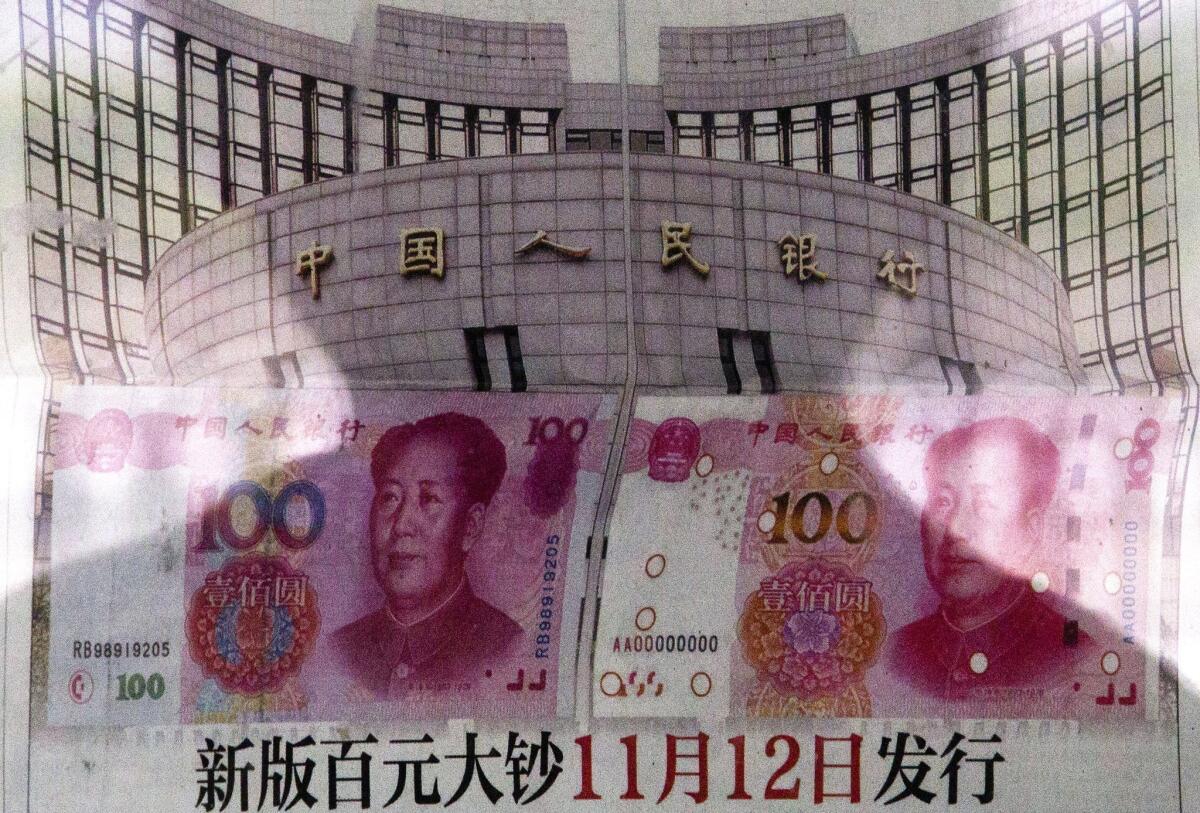Q&A:: Why China’s devaluation of the yuan matters so much

China devalued its tightly controlled currency on Tuesday following a slump in trade, triggering the yuan’s biggest one-day decline in a decade.
- Share via
China has devalued the yuan, also known as the renminbi or RMB.
The move Tuesday by the central bank comes as Chinese economic growth slows. First-half growth was 7% compared with the same period a year ago, the lowest in several years, and over the weekend, export data came in weaker than expected.
Here's what you need to know:
What does it mean for a country to devalue its currency?
Devaluation is a decision by a government to adjust the value of a currency downward relative to another currency or standard.
In China's case, the country's central bank has adjusted the daily trading band for the yuan, which is allowed to fluctuate 2% above or below a rate set by the People's Bank of China.
The basis on which the government had fixed the daily exchange rate has been a secret, though significant capital outflows in recent months have suggested that the yuan should be losing value and it hasn't.
NEWSLETTER: Get the day's top headlines from Times Editor Davan Maharaj >>
Why is the Chinese government doing this?
Analysts say one reason is to help boost its slowing economy. The central bank said the devaluation is an attempt to let market forces have a greater role in the yuan's exchange rate in that it will now fix the daily rate based on how the yuan closes in the previous trading session.
The U.S. and other trading partners have long called for the government to loosen its tight grip over the country's currency valuation, saying the decision hurt foreign competitors and gave Chinese exporters an unfair price advantage.
There might be an additional incentive. By the end of the year, the International Monetary Fund will review whether the yuan should be included in something called “special drawing rights,” which would basically mean including the yuan alongside the U.S. dollar, the euro, the British pound and the Japanese yen as a formal reserve currency.
The IMF has said China needs to do more to allow foreign access to its stock markets and make other changes before it includes the yuan in the special drawing rights.
Giving the market a bigger role in determining the value of the yuan would be a positive sign to the IMF and could help China achieve its stated goal of making the yuan a more international currency.
What's the impact in China?
The devaluation could help stimulate China's declining export industry and lift the country's economic growth.
As exports have softened, China runs the risk of large job losses in the manufacturing industries, which could be politically dangerous. Analysts, however, say a much bigger devaluation is needed to have a meaningful effect on China's large economy.
There may also be some collateral damage alongside any potential benefit to exports. A weaker yuan will raise costs of imports, including dollar-denominated commodities, such as oil, which led to the fall of Chinese airline stocks after the announcement.
It also can drive up the cost of servicing foreign debt held by Chinese companies.
See the most-read stories this hour >>
What is the U.S. impact?
U.S. stocks fell and prices for copper and oil dropped after China devalued the yuan, as investors viewed the move as a signal of slowing Chinese growth.
A cheaper yuan, of course, means a stronger dollar, and that hurts U.S. manufacturers that want to export to China by making American-made goods more expensive. It also likely means an increase in cheaper Chinese goods in the U.S., driving down import prices. Some analysts worry that China's devaluation may be exporting deflation around the world.
The devaluation of the yuan isn't likely to affect the U.S. Federal Reserve's plans to raise interest rates this year, though a string of similar moves by Beijing could give Fed officials pause.
A Treasury Department spokesperson reacted cautiously to China's devaluation and its planned reforms to its currency system.
“We will continue to monitor how these changes are implemented and continue to press China on the pace of its reforms, including additional measures to transition to a market-oriented exchange rate and ... an economy that is more dependent on domestic demand,” the department said.
“Any reversal in reforms would be a troubling development.”
How are other central banks and currencies likely to react?
At this point, experts aren't concerned that Beijing's devaluation will spark a currency war in which countries take steps to lower their currencies for competitive reasons.
Southeast Asian currencies — the Thai baht, Indonesian rupiah and Malaysian ringgit, among others — have been at their weakest levels in many years. And their currencies fell upon news of China's devaluation.
Although advanced economies also have intervened to keep their currencies from rising too much in recent years, both the European Union and Japan have seen the value of the euro and the yen, respectively, slide sharply against the yuan over the last two years because the Chinese currency is closely linked to the dollar.
Times staff writer Don Lee in Washington, D.C., contributed to this report.
ALSO:
A key to healing U.S. economy? Curbing currency manipulation
Russia's economy shrinks by 4.6% on low oil prices, sanctions
Does bitcoin's underlying technology have other uses? Investors think so
Inside the business of entertainment
The Wide Shot brings you news, analysis and insights on everything from streaming wars to production — and what it all means for the future.
You may occasionally receive promotional content from the Los Angeles Times.









